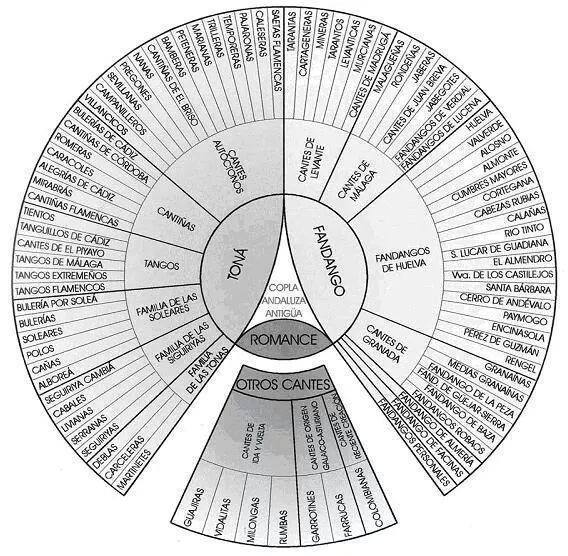|
Alboreá
Alboreá is a singing style whose name comes from “alboradas” singing which refers to “albor” (dawn). This singing has a Castilian origin. Alboreá is seldom part of flamenco recitals because there is superstition of bad luck should it be sung for anything that is not a gypsy wedding. It is usually sung in gypsy marriage rites and their lyrics are linked to this topic. For gypsy singers, this style should be kept for weddings and not be sung outside of these ceremonies. Its lyrics should be accompanied by 4 seven-syllable verses and a refrain. It is often sung with a libre (no beat structure) beginning followed by a 12 count measure, which can also sound like an abandolao rhythm in a 6 count measure, similar to bulerías. Discography ''Magna antología del cante flamenco, vol. III'', CD Edition, compiled by José Blas Vega, Hispavox, 1992 Sources https://flamenco.one/en/glossary/alborea/ ÁLVAREZ CABALLERO, Ángel: ''La discoteca ideal del flamenco'', Editorial Planeta, ... [...More Info...] [...Related Items...] OR: [Wikipedia] [Google] [Baidu] |
Flamenco Styles
Flamenco (), in its strictest sense, is an art form based on the various folkloric music traditions of southern Spain, developed within the gitano subculture of the region of Andalusia, and also having historical presence in Extremadura and Murcia. In a wider sense, it is a portmanteau term used to refer to a variety of both contemporary and traditional musical styles typical of southern Spain. Flamenco is closely associated to the gitanos of the Romani ethnicity who have contributed significantly to its origination and professionalization. However, its style is uniquely Andalusian and flamenco artists have historically included Spaniards of both gitano and non-gitano heritage. The oldest record of flamenco music dates to 1774 in the book ''Las Cartas Marruecas'' by José Cadalso. The development of flamenco over the past two centuries is well documented: "the theatre movement of sainetes (one-act plays) and tonadillas, popular song books and song sheets, customs, studies ... [...More Info...] [...Related Items...] OR: [Wikipedia] [Google] [Baidu] |
Spanish Music
In Spain, music has a long history. It has played an important role in the development of Western music, and has greatly influenced Latin American music. Spanish music is often associated with traditional styles such as flamenco and classical guitar. While these forms of music are common, there are many different traditional musical and dance styles across the regions. For example, music from the north-west regions is heavily reliant on bagpipes, the jota is widespread in the centre and north of the country, and flamenco originated in the south. Spanish music played a notable part in the early developments of western classical music, from the 15th through the early 17th century. The breadth of musical innovation can be seen in composers like Tomás Luis de Victoria, styles like the zarzuela of Spanish opera, the ballet of Manuel de Falla, and the classical guitar music of Francisco Tárrega. Nowadays commercial pop music dominates. Origins of the music of Spain The Iberian ... [...More Info...] [...Related Items...] OR: [Wikipedia] [Google] [Baidu] |
Andalusian Music
The Music of Andalusia encompasses a range of traditional and modern musical genres which originate in the territory of Andalusia in southern Spain. The most famous are copla and flamenco, the latter being sometimes used as a portmanteau term for various regional musical traditions within Andalusia. Today, Andalusia has a rich and thriving musical scene, which draws from its own musical traditions as well as from external influences such as salsa, jazz or pop music. Historical influences on Andalusian music Andalusia was probably the main route of transmission of a number of Near-Eastern musical instruments used in classical music; the rebec (ancestor of violin) from the ''Maghreb rebab'', the guitar from ''qitara'' and naker from ''naqareh''. Further terms fell into disuse in Europe; adufe from '' al-duff'', alboka from ''al-buq'', ''anafil'' from '' al-nafir'', exabeba from ''al-shabbaba'' (flute), atabal (bass drum) from ''al-tabl'', atambal from ''al-tinbal'', the balab ... [...More Info...] [...Related Items...] OR: [Wikipedia] [Google] [Baidu] |
Spanish Dances
Spanish might refer to: * Items from or related to Spain: **Spaniards are a nation and ethnic group indigenous to Spain **Spanish language, spoken in Spain and many Latin American countries **Spanish cuisine Other places * Spanish, Ontario, Canada * Spanish River (other), the name of several rivers * Spanish Town, Jamaica Other uses * John J. Spanish (1922–2019), American politician * "Spanish" (song), a single by Craig David, 2003 See also * * * Español (other) * Spain (other) * España (other) * Espanola (other) * Hispania, the Roman and Greek name for the Iberian Peninsula * Hispanic, the people, nations, and cultures that have a historical link to Spain * Hispanic (other) * Hispanism * Spain (other) * National and regional identity in Spain * Culture of Spain The culture of ''Spain'' is based on a variety of historical influences, primarily based on the culture of ancient Rome, Spain being a prominent ... [...More Info...] [...Related Items...] OR: [Wikipedia] [Google] [Baidu] |

